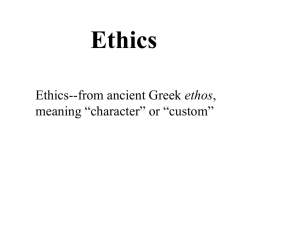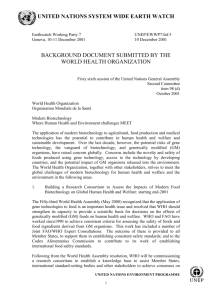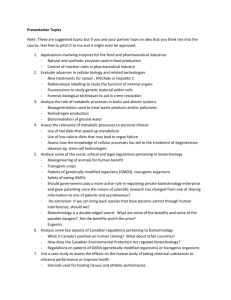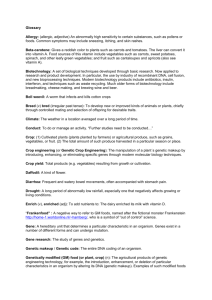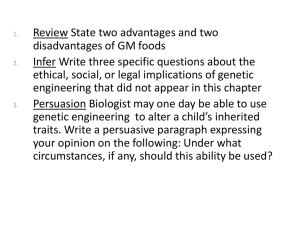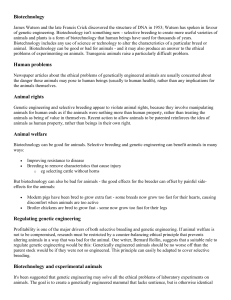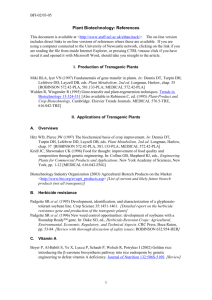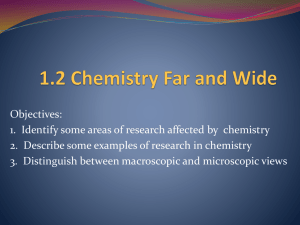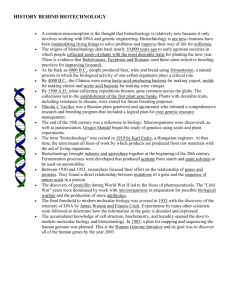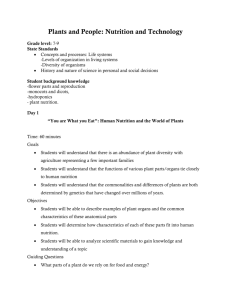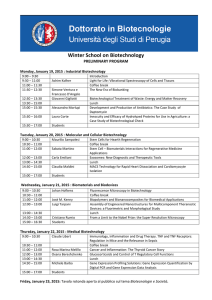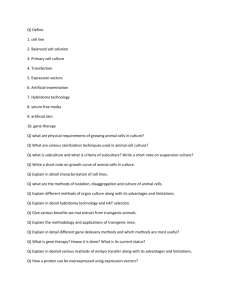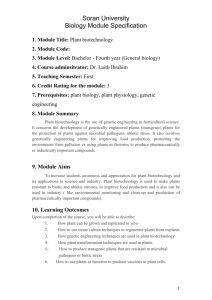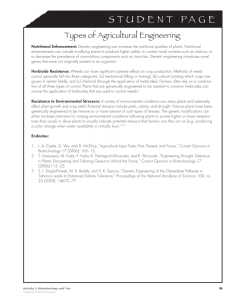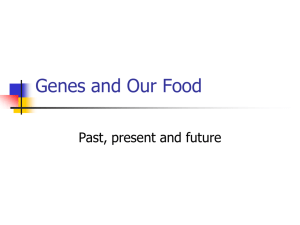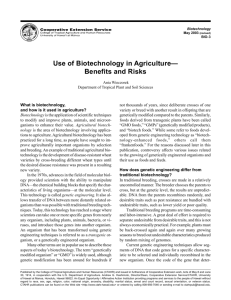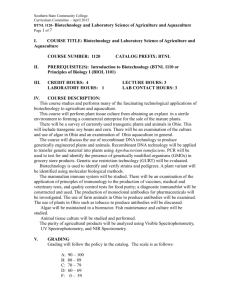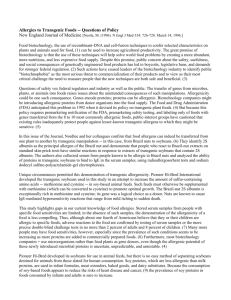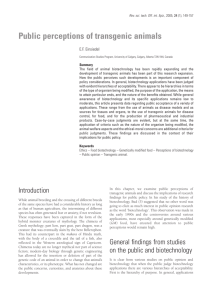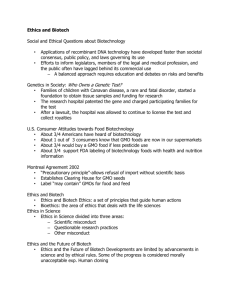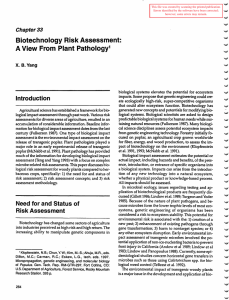Table S1. - BioMed Central
advertisement
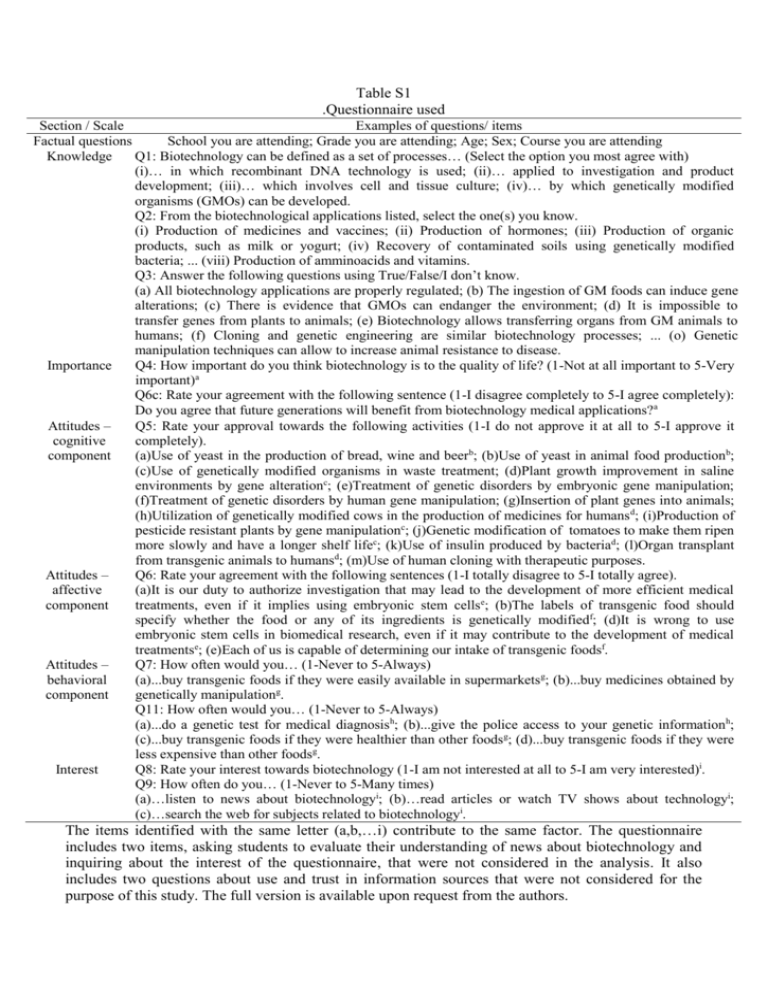
Table S1 .Questionnaire used Section / Scale Examples of questions/ items Factual questions School you are attending; Grade you are attending; Age; Sex; Course you are attending Knowledge Q1: Biotechnology can be defined as a set of processes… (Select the option you most agree with) (i)… in which recombinant DNA technology is used; (ii)… applied to investigation and product development; (iii)… which involves cell and tissue culture; (iv)… by which genetically modified organisms (GMOs) can be developed. Q2: From the biotechnological applications listed, select the one(s) you know. (i) Production of medicines and vaccines; (ii) Production of hormones; (iii) Production of organic products, such as milk or yogurt; (iv) Recovery of contaminated soils using genetically modified bacteria; ... (viii) Production of amminoacids and vitamins. Q3: Answer the following questions using True/False/I don’t know. (a) All biotechnology applications are properly regulated; (b) The ingestion of GM foods can induce gene alterations; (c) There is evidence that GMOs can endanger the environment; (d) It is impossible to transfer genes from plants to animals; (e) Biotechnology allows transferring organs from GM animals to humans; (f) Cloning and genetic engineering are similar biotechnology processes; ... (o) Genetic manipulation techniques can allow to increase animal resistance to disease. Importance Q4: How important do you think biotechnology is to the quality of life? (1-Not at all important to 5-Very important)a Q6c: Rate your agreement with the following sentence (1-I disagree completely to 5-I agree completely): Do you agree that future generations will benefit from biotechnology medical applications?a Attitudes – Q5: Rate your approval towards the following activities (1-I do not approve it at all to 5-I approve it cognitive completely). component (a)Use of yeast in the production of bread, wine and beer b; (b)Use of yeast in animal food productionb; (c)Use of genetically modified organisms in waste treatment; (d)Plant growth improvement in saline environments by gene alterationc; (e)Treatment of genetic disorders by embryonic gene manipulation; (f)Treatment of genetic disorders by human gene manipulation; (g)Insertion of plant genes into animals; (h)Utilization of genetically modified cows in the production of medicines for humans d; (i)Production of pesticide resistant plants by gene manipulationc; (j)Genetic modification of tomatoes to make them ripen more slowly and have a longer shelf lifec; (k)Use of insulin produced by bacteriad; (l)Organ transplant from transgenic animals to humansd; (m)Use of human cloning with therapeutic purposes. Attitudes – Q6: Rate your agreement with the following sentences (1-I totally disagree to 5-I totally agree). affective (a)It is our duty to authorize investigation that may lead to the development of more efficient medical component treatments, even if it implies using embryonic stem cellse; (b)The labels of transgenic food should specify whether the food or any of its ingredients is genetically modifiedf; (d)It is wrong to use embryonic stem cells in biomedical research, even if it may contribute to the development of medical treatmentse; (e)Each of us is capable of determining our intake of transgenic foodsf. Attitudes – Q7: How often would you… (1-Never to 5-Always) behavioral (a)...buy transgenic foods if they were easily available in supermarketsg; (b)...buy medicines obtained by component genetically manipulationg. Q11: How often would you… (1-Never to 5-Always) (a)...do a genetic test for medical diagnosish; (b)...give the police access to your genetic informationh; (c)...buy transgenic foods if they were healthier than other foodsg; (d)...buy transgenic foods if they were less expensive than other foodsg. Interest Q8: Rate your interest towards biotechnology (1-I am not interested at all to 5-I am very interested)i. Q9: How often do you… (1-Never to 5-Many times) (a)…listen to news about biotechnologyi; (b)…read articles or watch TV shows about technologyi; (c)…search the web for subjects related to biotechnologyi. The items identified with the same letter (a,b,…i) contribute to the same factor. The questionnaire includes two items, asking students to evaluate their understanding of news about biotechnology and inquiring about the interest of the questionnaire, that were not considered in the analysis. It also includes two questions about use and trust in information sources that were not considered for the purpose of this study. The full version is available upon request from the authors.
